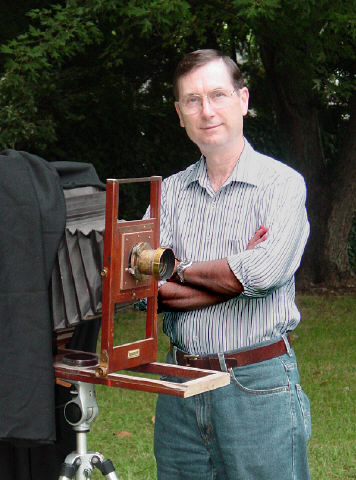|
|
|
|
 |
|
|
| Everyone has to start somewhere and my beginning was a Kodak Brownie
Hawkeye camera in the mid 1950's. Since then I've progressed, shooting
with 4x5 film in the 60's, the Mamiya C33 twin-lens reflex medium format
and Nikon F2 and F3 35mm cameras in the ‘70's and ‘80's, to all digital
with several Sony cameras today.
In high school I dabbled with 16mm movies but elected to concentrate exclusively on still photography. I loved to capture "moments" and enlarge them on paper to share with everyone. Initially, black and white was the only medium I could afford, but by the late 60's I transitioned to color negatives and transparencies. In college, I had a part-time job working as a photographer and lab assistant for the Director of the Arizona State University Audio-Visual Center. I also free-lanced doing portraits, weddings and assorted commercial work from my home studio and lab. Both jobs gave me plenty of opportunity to expand my skills and make a little money at the same time. I owe a tremendous debt of gratitude to the two significant mentors in my photographic life: The first, Dr. H. Gilbert Crecelius, my scoutmaster, who let me use the enlarger and chemicals where he worked. He encouraged me to experiment, make mistakes and learn that photography could be fun even though I had no money for expensive supplies and equipment. His zest for life and curiosity about everything around him continue to inspire me even today. The second, Richard Zimmerman, was my high school photo instructor for three years. He not only taught me the optics, physics and chemistry of photography, but challenged me to constantly see new things though the camera. He was easy going, but never accepted mediocre results. If he was pleased with your work, he blew it up to 16x20 and hung it up in the classroom. When he saw room for improvement, he let you know without hesitation. It was honest criticism you could respect and act on. I went to college expecting to emerge as a commercial photographer. I started out in the Art Department so I could take the photography courses, but after several semesters, I could see that there was more opportunity in the College of Mass Communications, so I switched my major to Radio & Television Broadcasting. By the time I graduated, I'd taken all the photo courses the university offered. When I completed college and was commissioned a Second Lieutenant in the US Air Force, I just assumed they would use my background in journalism, broadcasting and photography. But in 1968, Viet Nam changed just about everyone's plans. I was sent to Communications Officer school. From then on, electronics was my career and photography was my part-time activity. The air force presented me with several unexpected opportunities in photography. Each year they held photo contests at each base, with winners forwarded to the next higher level for additional judging. I submitted many of the photos at this web site to those contests and received over 50 awards. The other opportunity was teaching Beginning Photography for the Central Texas College extension at RAF Mildenhall, England. I relished each class because I could pass on to others what I'd learned over the years. My work undoubtedly has been influenced by the diverse masters of the early 20th century, such as Edward Weston, Philippe Halsman, Edward Steichen, Margaret Bourke-White, Alfred Eisenstaedt, to name a few, and most significantly, Ansel Adams. I look for a variety of things when I take photographs: (1) technical precision in exposure, focus and finishing; (2) simple composition that catches the eye; and (3) complete honesty to the mood and character of the original subject. There are some of my photos that have been candid shots caught in passing, but the majority have been the result of preparation, study, experimentation and extended shooting until I'm satisfied with the final result. Typically, it takes hours and lots of film to capture just the right image. Some photos are the result of days, months or even years of work. My advice to aspiring photographers is simple: Be excited about the
world around you and take lots of pictures. Only then can you share
with others the wonders that you experience.
|
|
|
|
|
|
|
|||||||||
|
|
|||||||||
|
|||||||||
|
|
|||||||||
|
|||||||||
|
|
|||||||||
|